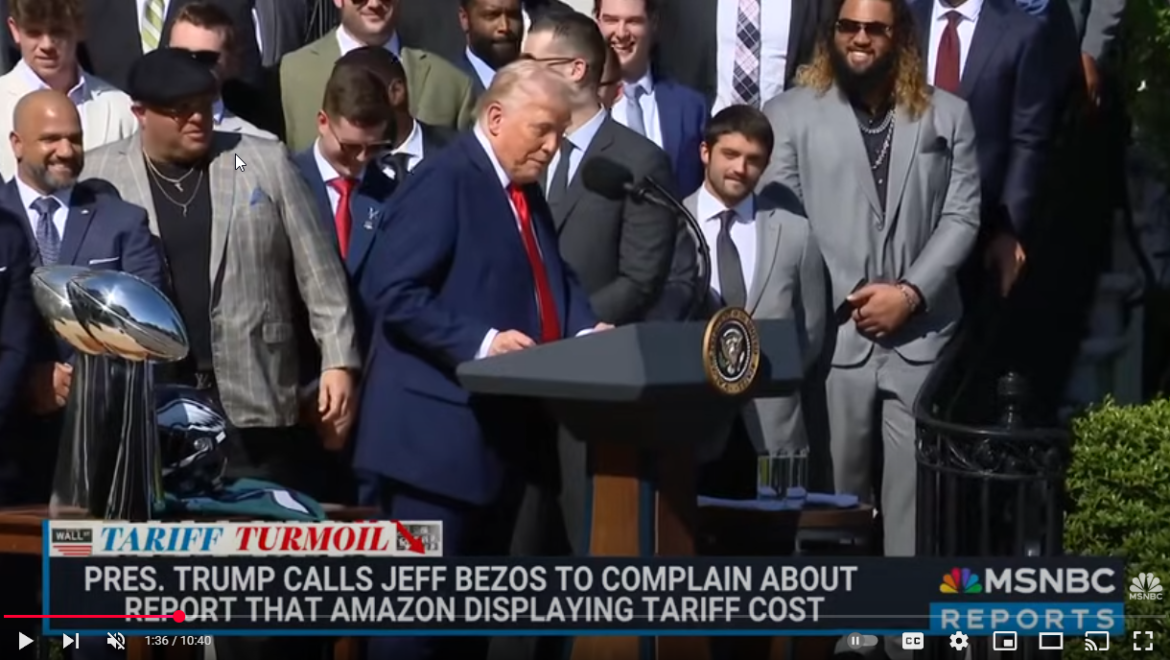President Donald Trump confirms that he has personally spoken with Amazon founder Jeff Bezos following reports that the retail giant considered displaying the impact of U.S. tariffs on product prices—an idea the White House has sharply criticized as “hostile and political.” Speaking to reporters outside the White House before departing for Michigan to mark his first 100 days back in office, Trump acknowledges the call, saying the conversation was “direct” and “firm.”
The reported plan would have had Amazon display messaging on certain product pages showing how much tariffs have raised the price of an item, with the intention of informing consumers about the impact of trade policy. Although such messaging was never implemented, the White House reacted swiftly to early reports, accusing Amazon of trying to politicize trade disputes and undermine public trust in U.S. economic strategy.
Amazon later stated that no such initiative had been finalized or approved, and clarified that it had no intention of implementing such a pricing transparency model at this time. Nevertheless, the issue touched off a firestorm in Washington and Wall Street, with observers seeing it as a flashpoint in the tense and often personal relationship between Trump and Bezos.
In his remarks to the press, Trump does not elaborate on the details of the conversation but makes clear he viewed the rumored plan as antagonistic. “We’re not going to let tech giants manipulate public opinion against the American worker. We’re defending fair trade, and I let him know that,” Trump said.
The president has long targeted Amazon and Jeff Bezos, dating back to his first term when he repeatedly criticized the company for its tax practices, labor policies, and dominance in the e-commerce market. He also frequently attacked The Washington Post, which is owned by Bezos, suggesting it served as a personal political weapon against him.
Trump’s renewed comments on tariffs and Amazon come as his administration doubles down on protectionist trade policies in his second term, expanding tariffs on goods from China, the European Union, and even some allies. His stance is part of a broader effort to bring manufacturing back to the U.S. and reduce dependency on foreign imports. The White House argues these measures are already helping to revitalize domestic industries, though critics point to inflationary pressures and supply chain disruptions as consequences of the aggressive tariff strategy.
While Amazon remains officially neutral in matters of trade policy, analysts note that large online retailers are uniquely exposed to the costs of tariffs due to their global supply chains and diverse product offerings. Any effort to visibly tag products with tariff impact data could be seen as a challenge to the administration’s narrative—and, politically, as an act of defiance.
Bezos, who has largely avoided direct public confrontation with Trump in recent years, has not issued a personal statement regarding the phone call. Amazon’s official response reaffirms its commitment to customer transparency while stating that any changes to its pricing or product display models are driven by internal business decisions, not politics.
In a separate moment during the same media exchange, Trump adds that he believes the U.S. now has a “very good” trade deal with India, though no formal announcement or deal details have yet been released. The comment is consistent with Trump’s recent push to highlight trade negotiations as major achievements during his second term.
The president’s Michigan speech later tonight is expected to focus on economic milestones, manufacturing job growth, and a reaffirmation of his “America First” trade doctrine. Meanwhile, the brief but impactful call with Bezos underscores the lingering tensions between the White House and major tech firms as the political and economic landscape continues to evolve.



